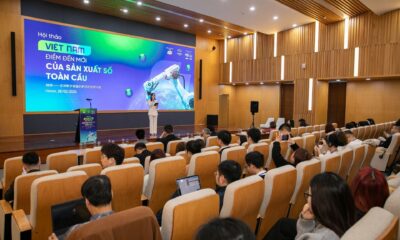Investing
HEINEKEN Vietnam proposes solutions for conducive business environment
Published
11 months agoon
On March 2, during a dialogue between Prime Minister Pham Minh Chinh and European businesses, Wietse Mutters, managing director of HEINEKEN Vietnam, reaffirmed Vietnam’s strategic importance to the company’s long-term growth and development.
He also shared key recommendations to support businesses in driving sustainable development and creating a stable business climate, ensuring that Vietnam remains an attractive destination for foreign investors.
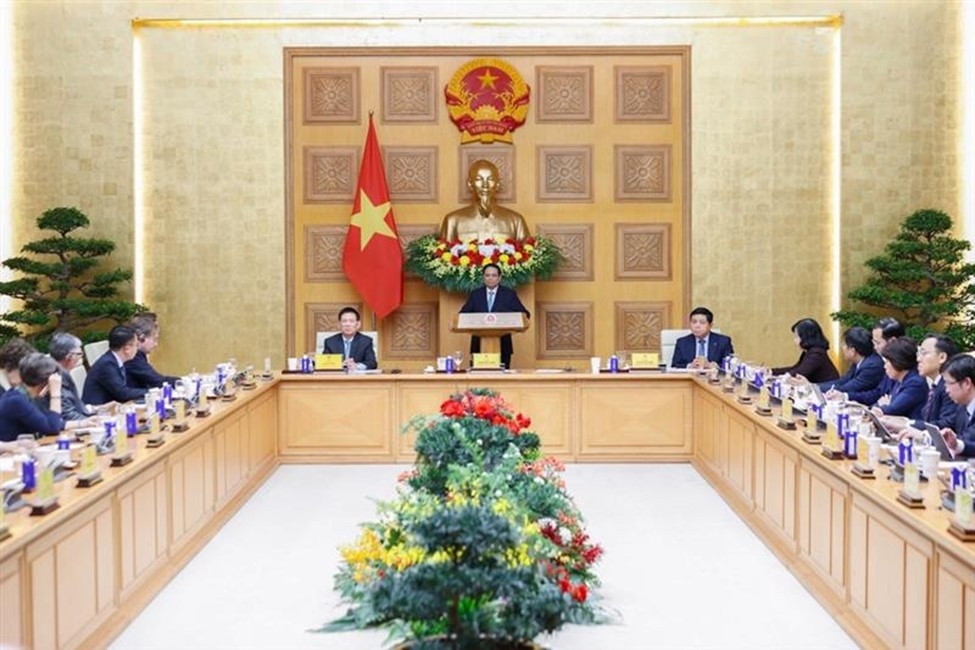 |
| Prime Minister Pham Minh Chinh chaired a constructive dialogue with European businesses in Hanoi on March 2. Photo: EuroCham |
As one of the first investors coming to Vietnam in the early 1990s, HEINEKEN Vietnam has grown into a leading fast-moving consumer goods company in the country, running five breweries and directly employing nearly 3,000 people nationwide. The company is also supporting more than 170,000 jobs across its entire value chain.
For more than 33 years, HEINEKEN Vietnam has consistently been among the top contributors to the state budget.
In 2023 alone, the company contributed to the local economy an equivalent of 0.5 per cent of Vietnam’s total GDP and 2.1 per cent of the total national tax revenue.
Driven by its ambition to ‘Brewing a Better Vietnam’, sustainability is central to the company’s business and operations.
The company’s long-term strategy focuses on three key pillars: Society, Responsible Consumption, and Environment, with an ambitious goal of achieving Net Zero in production by 2030.
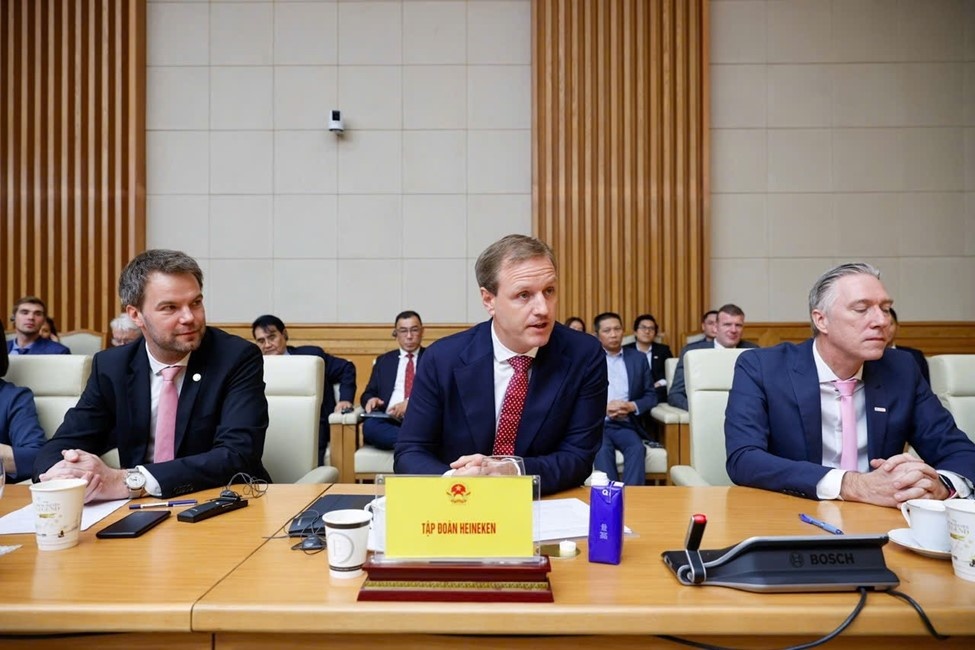 |
| Wietse Mutters (centre), managing director HEINEKEN Vietnam, shares his recommendations during the dialogue. Photo: EuroCham |
During the dialogue with Prime Minister Pham Minh Chinh, HEINEKEN Vietnam’s managing director confirmed the company’s continued strong belief in Vietnam’s potential, reflected in its high economic growth, acceleration in digitalisation and sustainable development.
To fully leverage this potential, Mutters set forth two key areas of focus: regulations to support the development of a circular economy, and the necessity of a stable and consistent investment environment.
Specifically, HEINEKEN Vietnam places strong emphasis on circularity in aluminium packaging production and the urgent need to establish a domestic aluminium can recycling infrastructure.
Mutters highlighted that a significant portion of the company’s products is in aluminium cans, with a preference for sourcing these cans from local manufacturers.
However, due to the lack of a rolling mill in Vietnam, brewers like HEINEKEN Vietnam have to export used cans abroad, where they are processed into aluminium rolls, before being imported back to Vietnam for new can production.
He emphasised the necessity for professional rolling plants that can recycle used aluminium for new production, reducing reliance on foreign recycled materials.
He expressed hope that the government would consider facilitating the licensing of professional aluminium rolling plants in Vietnam, laying the foundation for a circular economy.
This, in turn, would provide a solid platform for businesses to contribute more effectively to Vietnam’s net-zero 2050 goal.
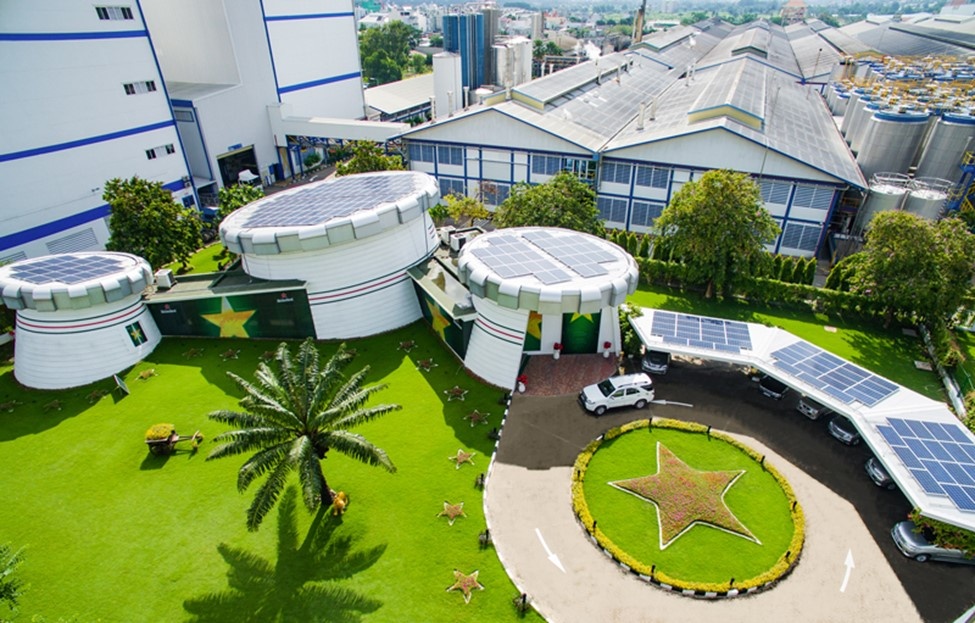 |
| HEINEKEN Vietnam has reduced carbon emissions in production by 93 per cent compared to 2018. Photo: HNV |
Regarding a stable business and investment climate, Mutters proposed a roadmap for the increase of excise tax on alcoholic beverages in the draft amendment to the Law on Special Consumption Tax (SCT).
To support individuals and businesses in recovering from a challenging period, the company has recommended that the government postpone the excise duties increase to 2027 and consider an appropriate adjustment.
The company advocates for a balanced proposal that ensures sustainable revenues, enhances the attractiveness of investments, and promotes the long-term effectiveness of policies.
In the dialogue, Mutters also addressed measures to enhance control and enforcement against the production of unregulated alcoholic beverages, especially when the increasing prevalence of illegally produced beer has become more difficult to monitor, posing risks to public health and the integrity of the economy.
These unauthorised production facilities do not only result in tax revenue losses for the government, but also create an uneven playing field for businesses that comply with all laws and regulations.
In light of these concerns, HEINEKEN Vietnam expects the Vietnamese government to take measures by directing relevant agencies to develop targeted solutions to regulate this sector effectively; ensuring a level playing field; raising public awareness about the risks of consuming unregulated beer; and enhancing enforcement measures to prevent further expansion of illegal beer production.
Finally, Mutters highlighted the importance of collaboration in establishing stable and predictable regulations for the beverage industry – one of the key sectors to Vietnam’s economy.
In closing, HEINEKEN Vietnam’s managing director reaffirmed the company’s commitment to growing alongside Vietnam and its people, emphasising its dedication to driving economic growth, realising sustainability ambitions, and making significant contributions to the country’s development.
Investing
Bac Giang International Logistics Centre launched
Published
10 months agoon
April 27, 2025Bac Giang International Logistics Centre was launched on April 22 with an investment of $168 million, and is expected to become a crucial link in the global supply chain.
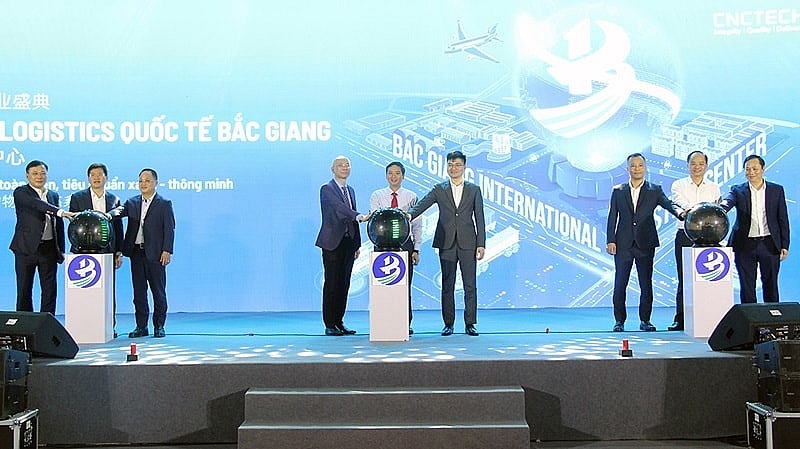 |
| Bac Giang International Logistics Centre launch |
Being invested by CNCTech Group, Dolphin Sea Air Services Corporation and Thien An Investment JSC, the logistics centre is located on National Highway 1A, which boasts first-class warehouse supply to meet the growing demand in the northern Vietnamese market.
Its strategic position within the golden economic triangle of Hanoi – Haiphong – Quang Ninh provides convenient connectivity to industrial zones and key logistics centres via national highways No.1A and No.37.
The centre is designed to meet growing demand for logistics infrastructure from businesses in Bac Giang and neighbouring provinces, positioning the area as a new node in northern Vietnam’s logistics network.
The project is a strategic product as a key component of the logistics spearhead in CNCTech Group’s industrial and logistics infrastructure ecosystem. It has been approved by the prime minister as a national level-II logistics centre, covering a planned area of 67 hectares.
At the launch ceremony, Chairman of Bac Giang People’s Committee Nguyen Viet Oanh said, “In recent years, the province’s socioeconomic development has made remarkable strides. Transportation, urban, industrial, and social infrastructure have been synchronously invested in and have yielded high efficiency. However, the province’s logistics service sector has not yet matched its potential, advantages, and socioeconomic development level. The logistics system remains fragmented, transportation costs are high, and trade delivery times are prolonged.”
Recognising this bottleneck, the local authorities have focused on directing the robust development of the logistics system, incorporating it into the provincial plan. This includes developing eight comprehensive logistics centres covering nearly 500ha, three inland container depots, and 33 inland waterway ports.
“Bac Giang, with its strategic location between Hanoi and border provinces, has long been known as a dynamic industrial hub. The remarkable development of the province’s industrial parks has created a solid foundation for the establishment of Bac Giang International Logistics Centre. This centre is not only located on vital transportation routes such as Hanoi-Lang Son Expressway but also directly connects to major border gates, optimising the transport of goods from Bac Giang to the world,” said Oanh.
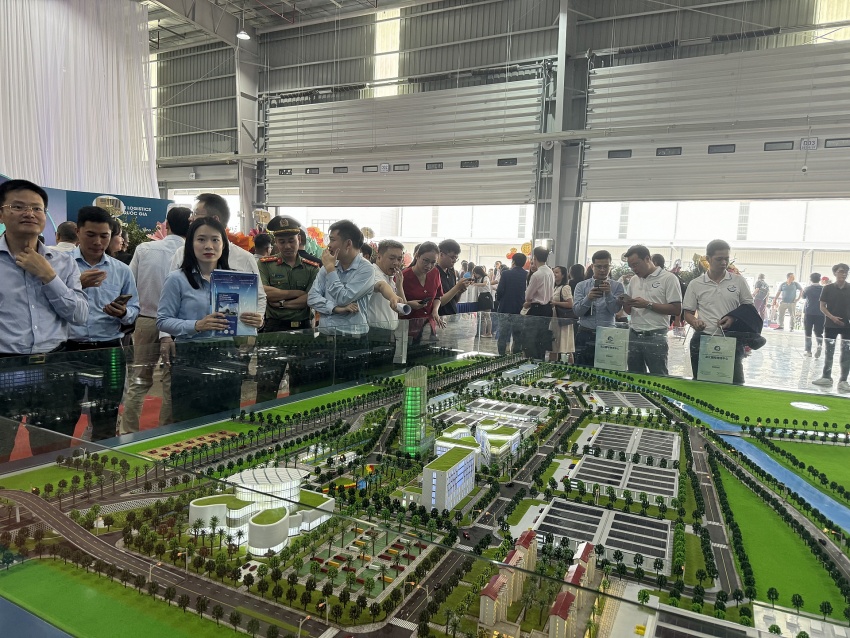 |
| A model of the logistics centre |
The project is not merely a warehousing facility, but also a symbol of the integration of modern infrastructure and advanced technology. The centre includes multifunctional warehouse areas, customs-controlled warehouses, non-tariff warehouses, and automated warehouses, meeting the needs of various industries. Notably, it integrates end-to-end logistics solutions, supporting businesses in optimising transportation costs and enhancing production efficiency.
With a long-term vision, the centre aims not only to optimise domestic supply chains but also to become a key connection point in the global logistics network.
Nguyen Van Hung, chairman of the Board of Members of CNC Tech Group, shared, “The establishment of this centre is a strategic step in developing Vietnam’s logistics infrastructure. We are committed to long-term and robust investment in this sector, as logistics is not just infrastructure but an indispensable part of enhancing the competitiveness of Vietnamese businesses on the international stage.”
Vietnam has taken strong action to promote green development among businesses, amid the country facing challenges in finance and technology.
Vietnamese Party General Secretary To Lam told the fourth Summit of the Partnering for Green Growth and the Global Goals 2030 (P4G), organised last week in Hanoi, that Vietnam is focused on strategic breakthroughs to prepare for a national development process that is fast, inclusive, and sustainable.
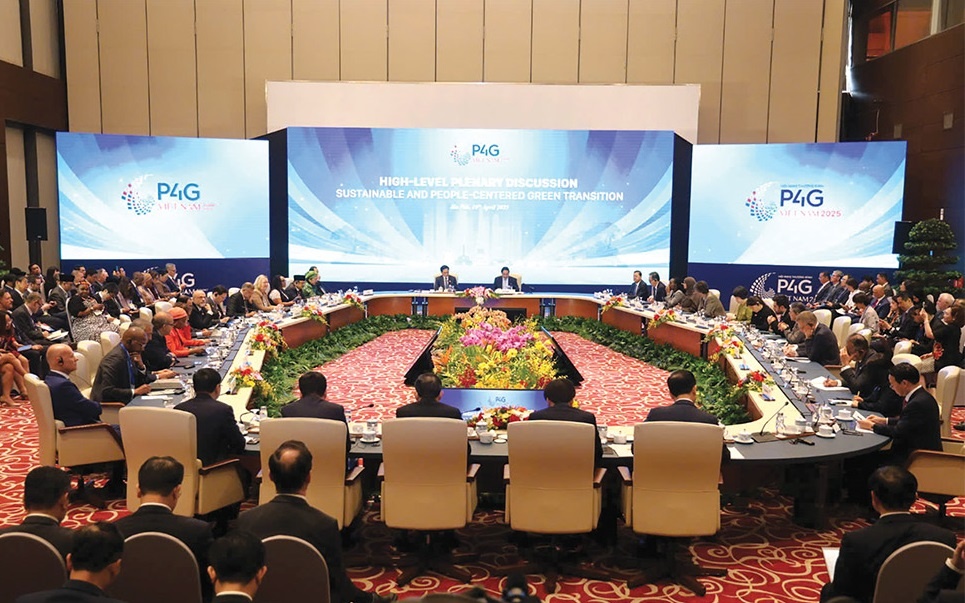 |
| The summit in Hanoi covered areas from finance and banking to agriculture and technology Photo: Dung Minh |
“We will strongly transform political commitments into practical actions, creating motivation for businesses and the whole society to participate in sustainable economic development, in which green institutions are the decisive foundation,” General Secretary Lam stressed at a hall attended by government leaders, UN representatives, diplomats, experts, and entrepreneurs.
General Secretary Lam also stressed that when it comes to green transformation, despite being a developing country with a transitional economy and limited resources, Vietnam has achieved some important results.
Besides making a 2050 net-zero commitment in 2021, Vietnam also endorsed six global initiatives at the time, on forest and land use, methane, clean power transition, sustainable food and agriculture, and more.
“Vietnam is now a leading country in supplying renewable energy in ASEAN, with wind and solar power capacity accounting for two-thirds of ASEAN’s total capacity,” he said.
“Additionally, Vietnam is also a good example of encouraging sustainable agriculture. The initiative to develop one million hectares of high-quality and low-emission specialised rice is a pioneering model that many partners and international organisations are interested in.”
A greener future
Vietnam is an active and responsible member of all multilateral mechanisms and major initiatives on green growth and energy transition such as the Paris Agreement on climate change, the Just Energy Transition Partnership, and the P4G.
“However, as a developing country with a transitional economy, we also face many challenges in terms of financial resources, technology, personnel, and resilience to the impacts of climate change and geopolitical fluctuations globally,” said General Secretary Lam.
The summit adopted the Hanoi Declaration, strongly affirming commitments to sustainable growth with people at the centre, and a determination to collaborate responsibly in addressing current global challenges. Vietnam is expected to enjoy continued support from the international community in its journey to a green economy including energy transition.
According to the World Bank, to ensure sufficient funding for responding to climate change, mobilising domestic finance is possible, but external support is needed.
Overall, Vietnam’s total incremental financing needs for the resilient and decarbonising pathways could reach $368 billion over 2022–2040, or approximately 6.8 per cent of GDP per year.
The resilient pathway alone will account for about two-thirds of this amount, as substantial financing will be required to protect the country’s assets and infrastructure as well as vulnerable people.
The cost of the decarbonising pathway will mainly arise from the energy sector – investments in renewables and managing the transition away from coal might cost around $64 billion between 2022 and 2040. All the figures are in net present value terms at a discount rate of 6 per cent.
This $368 billion in financing needs will include $184 billion from private investments or about 3.4 per cent of GDP annually, $130 billion or about 2.4 per cent of GDP annually from the state budget; and $54 billion or about 1 per cent of GDP per year from external sources.
Choi Youngsam, South Korean Ambassador to Vietnam, said that within the P4G framework, South Korea and Vietnam have completed or are currently implementing joint projects in areas such as food and agriculture, energy, water, and urban development.
“Looking ahead, both sides are expected to broaden and deepen their partnership under the P4G framework,” he said.
At the P4G Summit held in Seoul in May 2021, the two governments signed the Framework Agreement on Cooperation in Response to Climate Change, laying a solid policy foundation for the implementation of international emissions reduction ventures.
“On this basis, I hope that South Korea will leverage its technological expertise and financial resources to carry out greenhouse gas emission reduction projects in Vietnam, with both countries mutually recognising the results,” Ambassador Youngsam said.
“This would contribute to establishing a win-win model of emissions reduction cooperation. At the same time, I look forward to seeing active engagement from South Korean enterprises possessing green technologies, in close collaboration with the Vietnamese government.”
Encouraging developments
Deputy Minister of Science and Technology Hoang Minh said at a policy dialogue on the sidelines of the P4G 2025 that the active participation and strong cooperation from stakeholders – from the public and private sectors to international organisations – can help materialise Vietnam’s aspiration of an efficient and sustainable innovative startup ecosystem.
“Innovation, creative entrepreneurship and collaboration are key to solving environmental problems, while encouraging the development of a circular economy,” he said.
Vietnam currently has over 4,000 innovative startups, including two unicorns valued at over $1 billion, 11 companies valued at over $100 million, more than 1,400 startup support organisations, 202 co-working spaces, 208 investment funds, and 35 business promotion organisations. Among these, it is estimated that around 200–300 companies focus on green transition, covering areas such as renewable energy, environmental technology, sustainable agriculture, and the circular economy.
According to the Vietnamese Ministry of Foreign Affairs, hosting the fourth P4G Conference is of great significance to Vietnam. It is aimed to boost its role as a good friend, a reliable partner, and a responsible member of P4G and the international community. Moreover, it is also aimed to reaffirm its commitment to sustainable development, energy transition, and the goal of carbon neutrality by 2050. Besides that, it is aimed at contributing to raising awareness of international cooperation and encouraging the role and voice of developing countries in the sector of green growth and sustainable development.
| Pham Minh Chinh, Prime Minister
For Vietnam, together with digital transformation, we identify green transition as an objective necessity, a key factor, and a breakthrough driving force to promote rapid growth and sustainable development. This aligns with the strategic goal of becoming a developing country with modern industry and upper-middle income by 2030, and a developed, high-income country by 2045, while also contributing to the gradual realisation of Vietnam’s commitment at COP26 to achieve net-zero emissions by 2050. From practical experience with initial positive results, especially in renewable energy, green agricultural development, and participation in multilateral mechanisms and initiatives on green transformation, as the host of the fourth P4G Summit, Vietnam has three suggestions for discussions which pave the way for further cooperation in the coming time. First is to perfect green mindset, with a focus placed on the development of science and technology, innovation, and digital transformation linked to green growth. This includes recognising that green resources stem from green thinking, green growth is driven by green transition, and green resources arises from the green awareness of people and businesses in nations and regions throughout the world. Second is to build a responsible green community, in which, the government plays a guiding role, encouraging, and ensuring a stable and favourable institutional environment for green growth. The private sector functions as a core investor into technological development and the dissemination of green standards. The scientific community take the lead in developing green technologies and training green human resources. Meanwhile, citizens continuously enhance their green awareness, truly becoming beneficiaries of the outcomes of green transformation. Thirdly, it is necessary to promote international cooperation and robust multilateral green cooperation models, particularly public-private partnerships, South-South cooperation, North-South cooperation, and multilateral cooperation frameworks. This is aimed at removing institutional barriers, enhancing access, and speeding up the flow of green capital, green technology, and green governance. Developed countries should take the lead in fulfilling commitments to provide financial, technological, and institutional reform support. Meanwhile, developing countries would need to leverage their internal strengths and effectively utilise external resources. |
Investing
Public-private partnerships a lever for greener innovation
Published
10 months agoon
April 26, 2025Public-private partnerships are no longer a supporting mechanism, but a strategic pillar in the global pursuit of the green transition.
The high-level dialogue between government leaders and businesses at the 2025 P4G Vietnam Summit last week, chaired by Prime Minister Pham Minh Chinh, brought together senior officials, global experts, international organisations, and private sector leaders.
They recognised that the climate crisis, digital transformation, and resource depletion are converging in ways that demand not only innovation, but deep and long-term collaboration between the public and private sectors.
UN Deputy Secretary-General Amina J. Mohammed acknowledged Vietnam’s leadership in renewable energy, noting its potential to attract trillions in sustainable investment.
“Emerging economies must accelerate the adoption of new investment models, particularly those that align private capital with green infrastructure priorities. Governments must work with the private sector to expand ambition, strengthen accountability, and deliver real impact,” she said.
From Italy, Prime Minister’s Climate Envoy Francesco Corvaro stressed that public-private partnerships (PPPs) are indispensable in addressing climate finance gaps. Drawing from Italy’s experience, he underscored the importance of public investment as a risk mitigator, enabling private sector participation in clean energy and smart infrastructure projects.
“Public investment can unlock private capital, but local authorities must lead with clear priorities and long-term vision,” Corvaro noted. “You can’t talk about renewables, AI, or digital infrastructure without modern, resilient grids, and that requires strong public-private alignment.” he said
Alejandro Dorado, Spain’s High Commissioner for Circular Economy, argued that the case for stronger PPPs lies at the intersection of two accelerating forces: the environmental-climate crisis and a wave of disruptive technologies.
“In a world where AI, green technologies, and digitalisation are reshaping the global economy, the clock is ticking. According to the Intergovernmental Panel on Climate Change, we have less than a decade to prevent irreversible climate disaster. Meanwhile, the World Economic Forum has identified biodiversity loss as one of the most severe economic risks,” he said.
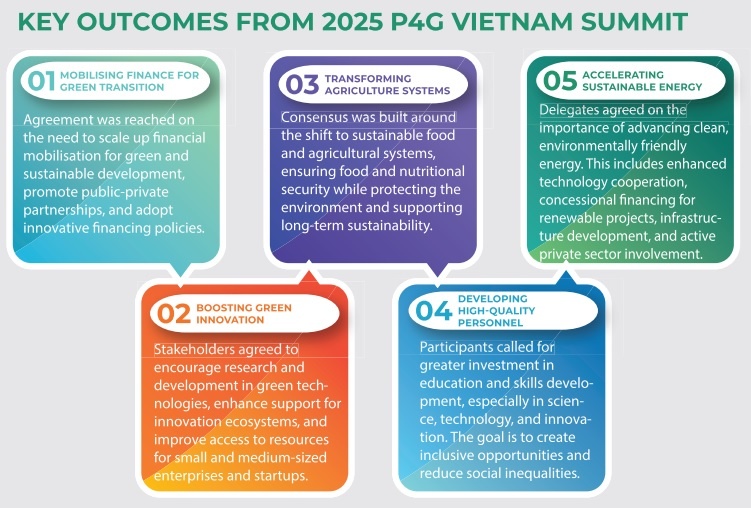 |
Dorado added that while multilateralism is being questioned or weakened in some quarters, the need for cooperation has never been more urgent – both to solve environmental challenges and to harness the transformative potential of innovation.
“No government or business can tackle these crises alone. Public authorities must provide the regulatory frameworks, fiscal incentives, and infrastructure deployment needed at scale to safeguard the common good,” he stressed.
From the business side, Stuart Livesey, country representative of Copenhagen Infrastructure Partners (CIP), provided a frank but optimistic outlook. Livesey stated CIP’s commitment to supporting Vietnam’s transition, but emphasised the need for enabling conditions.
“What we seek are clear, bankable projects underpinned by stable regulatory frameworks, collaborating with strong local partnerships. This is where public-private cooperation becomes not just helpful, but essential,” Livesey noted. “Over the next 10-15 years, the offshore wind sector and green energy consumers will trigger massive demand for new technologies, digital solutions, and skilled labour.”
To meet this demand, CIP is investing not only in infrastructure, but also in capacity building, research and development, and local supply chain development through partnerships with Vietnamese universities.
Still, he acknowledged barriers. “Technological application and innovation in green projects face challenges, from long-term financing constraints and skilled labour shortages to fragmented policy signals. These are not unique to Vietnam, but they require proactive, tailored local solutions,” he said. “Addressing issues such as grid availability, regulatory clarity, and inter-ministerial coordination will be critical.”
Tim Evans, CEO of HSBC Vietnam, stated that the banking sector is ready to facilitate green finance, particularly in sectors aligned with national climate targets.
“We see ourselves as a bridge between global capital and local sustainability goals. The clearer the pipeline of bankable, climate-aligned projects, the faster we can move capital,” he noted. “What’s crucial now is consistency in policy and coordination among stakeholders to ensure these projects reach maturity.”

Bac Giang International Logistics Centre launched

Vietnam’s Exclusive Economic Zone boasts over 1,000 GW of wind power potential: report

Uncertainty weighing on real estate

Central Vietnam city seeks $1.84 bln for 15 projects in economic zone


